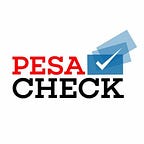HOAX: Posta Kenya is not giving out cash subsidies
Posta Kenya has denounced the site giving out the subsidies.
A site mimicking the Postal Corporation of Kenya, also known as Posta Kenya, and offering cash subsidies is a HOAX.
On clicking the link circulating on WhatsApp, the text on the site states that there are postal subsidies by the government and users have a chance to win $8,000 if they answer a questionnaire.
The site also has Posta Kenya’s logo and a photo of what seems to be an event launch.
Users are then asked to select answers from a series of questions seeking to establish whether they know Posta Kenya, their age, their review of the state corporation, and their gender.
They are thereafter informed that they have been selected to participate in a raffle for a chance to win gifts.
On the third attempt, users are informed that they have won the prize money, but they have to tell five groups or 20 friends about the promotion. They are then asked to complete registration, following which the gifts will be delivered to them within five to seven days.
That the site asks users to share the promotion with their contacts before they can redeem the prize raises suspicion. A previous PesaCheck article exposed this as typical of online hoaxes in a bid to expand their reach.
Such sites could also be used for phishing, where users end up getting their personal information stolen for fraudulent purposes.
A WhoIs search of the domain shows it was registered in 2022 while the registration of the legitimate website of Posta Kenya, posta.co.ke, was done in 2003. Legitimate sites tend to be older than hoax sites.
PesaCheck reached out to the state corporation, which denounced the site we are fact-checking.
“I can confirm that that’s not our site. Ours is www.posta.co.ke,” PCK Business Systems Manager Sammy Gimoi responded to our query.
PesaCheck has reviewed a site mimicking the Postal Corporation of Kenya, aka Posta Kenya, and offering cash subsidies, and found it to be a HOAX.
This post is part of an ongoing series of PesaCheck fact-checks examining content marked as potential misinformation on Facebook and other social media platforms.
By partnering with Facebook and similar social media platforms, third-party fact-checking organisations like PesaCheck are helping to sort fact from fiction. We do this by giving the public deeper insight and context to posts they see in their social media feeds.
Have you spotted what you think is fake or false information on Facebook? Here’s how you can report. And, here’s more information on PesaCheck’s methodology for fact-checking questionable content.
This fact-check was written by PesaCheck Fact-Checker Harriet Ogayo and edited by PesaCheck Senior Copy Editor Cédrick Irakoze and acting Chief Copy Editor Francis Mwaniki.
The article was approved for publication by PesaCheck Managing Editor Doreen Wainainah.
PesaCheck is East Africa’s first public finance fact-checking initiative. It was co-founded by Catherine Gicheru and Justin Arenstein, and is being incubated by the continent’s largest civic technology and data journalism accelerator: Code for Africa. It seeks to help the public separate fact from fiction in public pronouncements about the numbers that shape our world, with a special emphasis on pronouncements about public finances that shape government’s delivery of Sustainable Development Goals (SDG) public services, such as healthcare, rural development and access to water / sanitation. PesaCheck also tests the accuracy of media reportage. To find out more about the project, visit pesacheck.org.
PesaCheck is an initiative of Code for Africa, through its innovateAFRICA fund, with support from Deutsche Welle Akademie, in partnership with a coalition of local African media and other civic watchdog organisations.
